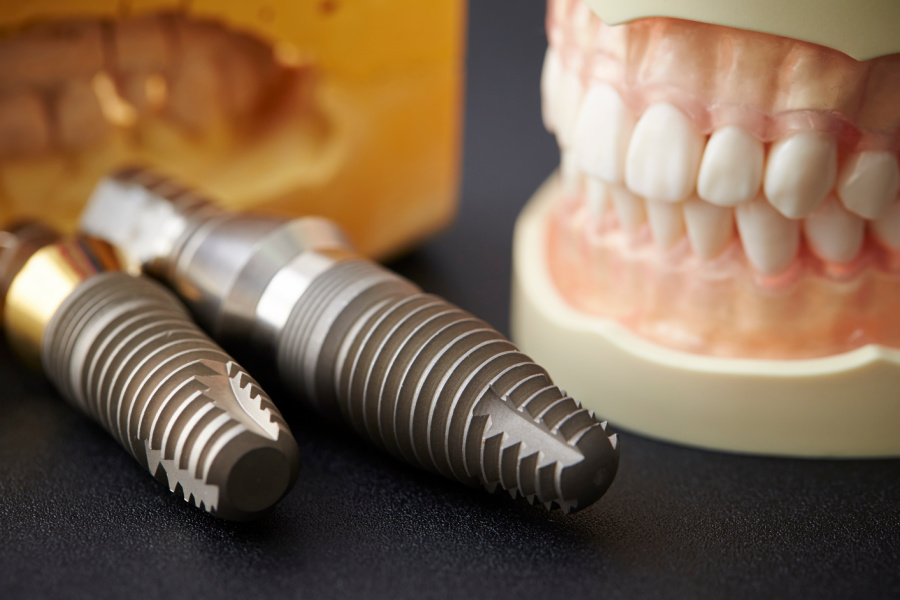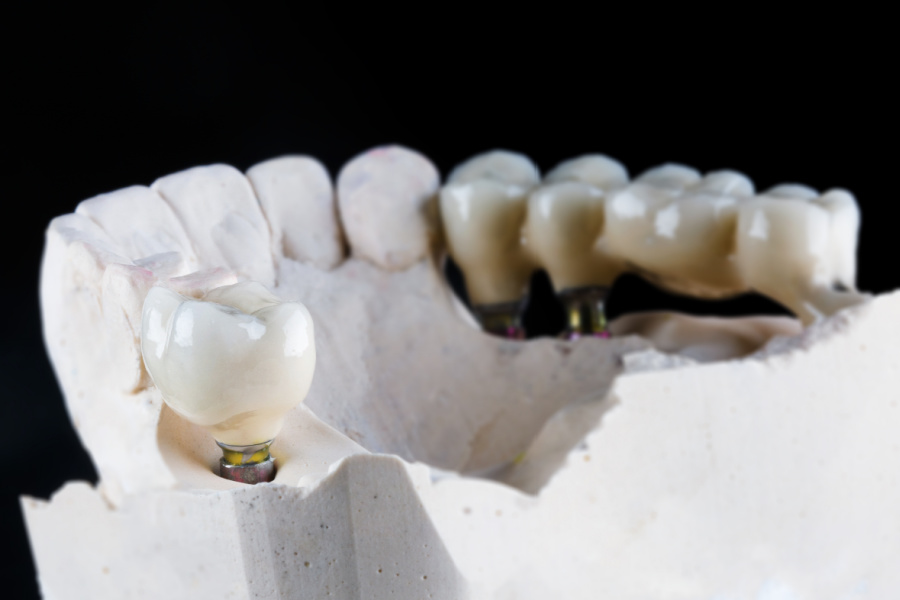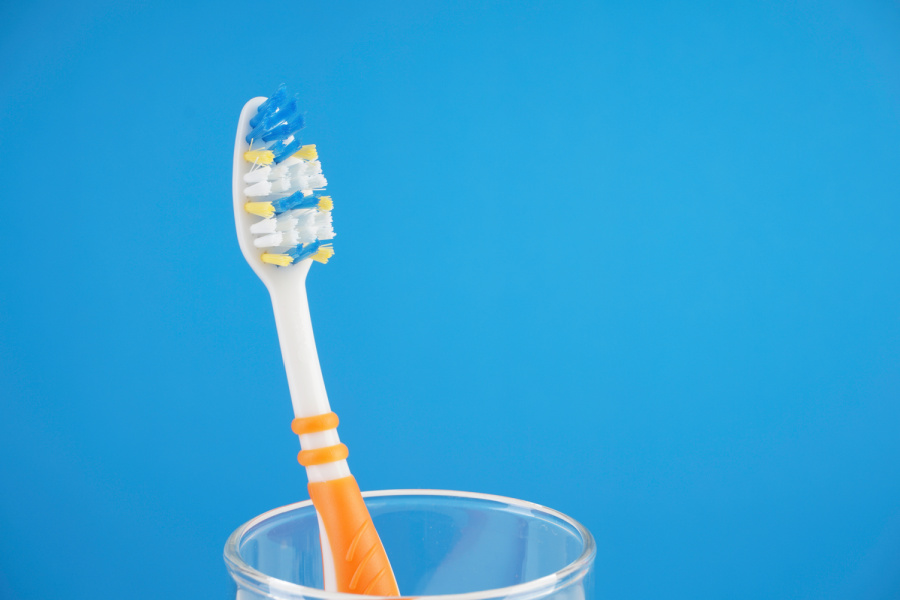
Dental implants are a popular and effective way to replace missing teeth. While their use in the UK has traditionally been lower than in other European countries, demand is rising quickly, with the dental implant market growing significantly in recent years.
In this article, we’ll cover what dental implants are, how long they typically last, the factors that influence their longevity, and how to care for them properly. Dental implants are generally only available through private treatment, except in certain cases involving specific medical conditions. If you're thinking about dental implant surgery, our experienced team is here to guide you through the process.

A dental implant is a small titanium screw that’s surgically placed into your jawbone, acting as an artificial tooth root. This creates a stable base for a replacement tooth (a crown) or a dental bridge, which is used to replace two or more missing teeth.
Over time, the implant bonds with the surrounding bone in a process called osseointegration, helping it become securely anchored in place.
In some cases, there may not be enough bone to support an implant. This can happen due to gum disease, trauma, or natural bone loss after a tooth extraction. If this is the case, your dentist may recommend a bone augmentation procedure, such as a bone graft, to rebuild the area.
Autologous bone grafting—using bone taken from another part of your body, such as the hip or shin—is considered the most effective method. Other options include using synthetic (alloplastic) bone, animal-derived (xenograft), or human donor (allograft) bone, although these alternatives are generally less successful in comparison. Once the graft has healed and fused with your jawbone, it can provide a strong foundation for the implant.
If you’ve lost one or more teeth due to decay or injury, a dental implant may be an ideal solution. Tooth loss is commonly caused by dental decay and trauma, and implants offer a reliable way to restore function and appearance.
Unlike bridges, which rely on neighbouring teeth for support, dental implants are anchored directly into the jawbone. This provides superior strength, long-term stability, and a more natural feel—making them a durable and effective option for tooth replacement.
Dental implants are designed to be a permanent solution, with a success rate of 90-95% over a 10-year period. Many implants can last 20 years or more, though the implant itself often outlasts the crown attached to it.
After the implant has had time to fuse with the jawbone, usually a few months, an abutment—a small post—is connected to the implant and extends through the gum to support the crown. Research indicates that 50-80% of crowns last between 15 and 20 years. Since crowns endure daily wear and tear, they are more prone to damage compared to the implant. Crowns are also less expensive and easier to replace than implants.
While dental implants are generally very successful, there is still a risk of failure in the months or years following placement. Next, we’ll explore the factors that can influence the lifespan of dental implants in more detail.
There are many factors that affect the lifespan of a dental implant. Some of these factors include:
If your jawbone doesn’t have enough density or volume to support a stable implant, or if a medical condition affects your jawbone health, the implant may be at risk of failure.
Before placing an implant, your jawbone will be carefully evaluated—usually with X-rays or 3D imaging. If there isn’t sufficient bone, a bone augmentation procedure might be recommended to create a solid foundation for the implant.
Bone quality can also decline over time due to conditions like osteoporosis, which weakens bones, or peri-implant disease, which causes inflammation around the implant site.
Peri-implant disease occurs when plaque accumulates around the dental implant. In early stages, it can be reversed with proper care, but if left untreated, it may develop into peri-implantitis.
Peri-implantitis is an inflammatory gum condition that can lead to implant failure, underscoring the importance of excellent oral hygiene after receiving a dental implant.
Bruxism—repetitive grinding or clenching of teeth, often during sleep or stress—can negatively affect dental implants.
This grinding may loosen the implant screw or cause fractures in the implant, screw, or crown. Repeated movements can disrupt osseointegration, the vital process where the implant fuses securely with the jawbone.
The skill and experience of your surgeon are crucial to the success of your implant. An inexperienced practitioner may incorrectly position the implant, attach the crown too soon, or cause injury to the surrounding tissues during placement.
At Ora Dental, our oral and maxillofacial surgeons are highly experienced in dental implant procedures and related surgeries, including private wisdom tooth removal. Choosing one of our specialists ensures expert care and peace of mind.

Like natural teeth, ceramic crowns on implants can crack or become damaged. Common causes include:
It’s important to use your teeth only for chewing food, as using them as tools can shorten the lifespan of both natural and artificial teeth.
Depending on the extent of damage, your dentist may be able to repair a cracked crown without needing full replacement, provided the implant itself remains intact.
Jaw trauma can dislodge an implant similarly to a natural tooth, and you may need to wait for healing before considering implant replacement.
Certain health conditions can influence how long your dental implant lasts. For instance, patients receiving radiotherapy or radiochemotherapy for cancer have a higher risk of late implant failure.
Those undergoing high-dose antiresorptive therapy (ART) for bone cancer are at increased risk of complications after implant surgery, although patients on low-dose ART for osteoporosis generally experience good implant survival rates.
Medications such as blood thinners and immunosuppressants may also affect implant success.
Diabetes is associated with a greater risk of implant failure, while factors like hypertension, coronary artery disease, gender, steroid therapy, chemotherapy, pulmonary disease, and lack of hormone replacement therapy in postmenopausal women do not show a higher risk.
The type and position of the tooth being replaced affect implant longevity. Teeth at the back of the mouth bear more chewing pressure, which may reduce implant lifespan compared to less frequently used teeth.
People aged 60 to 79 face a significantly higher risk of implant failure than those under 40, potentially due to slower healing rates in older adults.
There are several ways to maximise the lifespan of your new dental implant. Some factors (like age) are beyond your control, but there are choices you can make to give you the best chance of a long-lasting implant.
Smoking and heavy drinking can significantly reduce the lifespan of your dental implant. Smoking encourages bacterial plaque buildup around the implant, increasing the risk of peri-implantitis.
Smoking also lowers oxygen levels in your bloodstream, slowing down healing throughout your body. This makes your gums more vulnerable to infection and less able to heal properly if infected. Quitting smoking around the time of surgery can lower the risk of surgical site infections.
After implant surgery, it’s important to avoid alcohol for at least 72 hours. Alcohol thins your blood, which can prevent the formation of the necessary blood clot in your gums.
Excessive drinking can also cause dehydration, which impairs healing at any stage after surgery. Dry gums may not recover as well as they should.

Dental implants require care just like natural teeth. While the titanium implant and ceramic crown don’t decay, the gums and surrounding teeth can still develop problems.
You remain at risk of gum disease, which can lead to implant failure. Good oral hygiene is therefore crucial for maintaining a long-lasting implant and protecting your other teeth.
Brushing twice daily and flossing every day will help keep your gums healthy and reduce plaque buildup around your implant and natural teeth.
Regular dental check-ups are essential after implant surgery. Your dentist can spot early signs of gum disease and provide treatment if necessary. They will also offer advice on how to keep your implant healthy for the long term.
If your dental implant is failing, you might notice certain symptoms. Watch out for:
If you experience any of these symptoms, it’s important to schedule an appointment with your dentist or surgeon as soon as possible.
In some cases, peri-implantitis can be treated without removing the implant, especially if there hasn’t been significant bone loss. The area around the implant will be carefully cleaned, and you may be prescribed antibiotics to clear the infection.
If the implant has failed, it might need to be removed and possibly replaced. This procedure is typically done under local anaesthetic. Should there be bone loss, a bone graft may be required before placing a new implant, which can take several months to heal.
If replacing the implant isn’t possible or if you choose not to, other options include dentures or dental bridges to restore your smile.